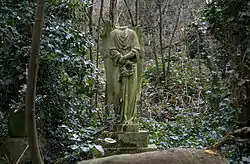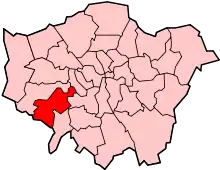| Barnes Old Cemetery | |
|---|---|
 Decapitated statue of an angel at Barnes Cemetery | |
| Details | |
| Established | 1854 |
| Location | |
| Country | England |
| Coordinates | 51°28′16″N 0°14′04″W / 51.4710°N 0.2344°W |
| Type | Disused |
| Owned by | Richmond upon Thames London Borough Council |
| Size | 2 acres (0.81 ha) |
| Find a Grave | Barnes Old Cemetery |
Barnes Cemetery, also known as Barnes Old Cemetery, is a disused cemetery in Barnes, in the London Borough of Richmond upon Thames. It is located off Rocks Lane on Barnes Common.
History
The cemetery was established in 1854 on two acres of sandy ground purchased by the Church of England for the sum of £10. A chapel, lodge and landscaping were provided at a further cost of £1,400. The cemetery functioned as an additional burial ground to the local parish churchyard.[1] It was well-used and a number of distinguished Victorians were buried there, with a variety of monuments and statues erected to their memory. At the centre of the cemetery is a large memorial to the Hedgman family, who were local benefactors in Barnes.[2] The cemetery was claimed to be haunted by a ghostly nun that would hover over the grave of Julia Martha Thomas, the victim of an infamous murder in 1879.[1]
In 1966 the cemetery was acquired by the London Borough of Richmond upon Thames with the intention of turning it into a lawn cemetery, a grass-covered area where each grave is marked with a commemorative plaque rather than standing memorials. The council demolished the chapel and lodge and removed the boundary railings to prepare the cemetery for its new role. However, it then dropped the plans and effectively abandoned the cemetery.[2]


Over the next thirty years or so, the site was subject to considerable damage and vandalism to graves and monuments. However, within the past decade, the site has seen significant change. No longer neglected, much thought and care now goes into the management of this beautiful old cemetery. Indeed, its resultant ‘gothic charm’ and evocative light levels that have been enhanced by selective thinning and conservation work, make it a popular site for local art and film students. The overgrown nature of today's cemetery provides a valuable sanctuary for birds and other fauna. With good feeding grounds all around, many native birds and summer visitors breed in the cemetery, including thrushes, wrens, tits, finches, blackcap, chiff chaff, willow warbler, goldcrest while others migrate through. Some of the original planting is still in evidence: large specimens of yew, cedar, holly, Holm oak, pines and Wych elm. Many of these have produced thickets of seedlings and saplings. There are also native deciduous trees such as oak, ash and birch, and bird-sown shrubs such as elder. In some of the more open glades you can see pretty herbaceous species such aslike Herb Robert, Ox-eye Daisy and foxglove. For its part, Richmond upon Thames Council describes the cemetery as an "atmospheric and romantic place" with "an evocative atmosphere of decay and seclusion".[3]
Notable interments
- Alexander Joseph Finberg (1886–1939) was an art historian focused on the history of British art. He was a founder of the Walpole Society and an expert on J. M. W. Turner.
- James Heywood (1810–1897), philanthropist, MP and social reformer[1]
- Charles Innes (d. 1907), architect who designed St Michael's Church in Barnes and rebuilt much of the parish church[4]
- Augustus Mayhew (1826–1875), journalist and author[1]
- Ebenezer Cobb Morley (1831–1924), regarded as the father of The Football Association and modern football[5]
- Francis Turner Palgrave (1824–1897), professor of poetry, Oxford University[1][6]
- Henry William Pickersgill (1782–1875), portrait painter.[1] An inscription on his memorial also commemorates his wife Jeanette Pickersgill (d. 1885), the first person to be legally cremated in the UK. Her ashes are at Kensal Green Cemetery[1]
- Youssef Sirrie or Joseph Sirry (1830–1880), Syrian-born servant of the property developer, Henry Scarth. The pub "The Arab Boy" is named after him. He inherited Scarth's estate.[7]
- Julia Martha Thomas (d. 1879), murder victim[8]
- Samuel Rabbeth (1858–1884), a young doctor who died from diphtheria contracted from a child patient whom he attempted to save.
- Edward Williams (1781–1855), landscape painter[1]
- His sons, Henry John Boddington (1811–1865), landscape artist[1]
- George Augustus Williams (1814–1901), landscape artist
War graves
Ten Commonwealth service personnel, whose graves are registered and maintained by the Commonwealth War Graves Commission, are buried at the cemetery, seven from World War I and three from World War II.[9]
See also
- East Sheen Cemetery, originally known as Barnes ("New") Cemetery
References
- 1 2 3 4 5 6 7 8 9 Miller, Hugh; Parsons, Brian (2013). London Cemeteries: An Illustrated Guide and Gazetteer. The History Press. ISBN 978-0-7524-9690-0.
- 1 2 Beech, Darren; Gilmour, Lesley (2011). London's Cemeteries. Metro Publications. p. 105. ISBN 978-1-902910-40-6.
- ↑ Environment Directorate, London Borough of Richmond upon Thames (May 2007). "Barnes Common and Mill Hill Conservation Area Study" (PDF). London Borough of Richmond upon Thames. p. 10. Retrieved 29 January 2012.
- ↑ "Innes, Charles G D" (PDF). Local architects. Barnes and Mortlake History Society. Archived from the original (PDF) on 4 March 2016. Retrieved 5 April 2015.
- ↑ Rudd, Alyson (7 April 2008). "The father of football deserves much more". The Times. London. Retrieved 1 May 2010.
- ↑ "Francis Turner Palgrave". London Remembers. Retrieved 27 July 2016.
- ↑ Evison, Philip J (2017). "The Burial Grounds of Putney" (PDF). The Putney Society. p. 8.
- ↑ "The Barnes Mystery". The Manchester Guardian. 30 March 1879. p. 6.
- ↑ "Barnes Old Cemetery". Commonwealth War Graves Commission. Retrieved 19 November 2018.
External links
- Aerial view from 1921, from the English Heritage "Britain from Above" archive
- Barnes Cemetery at Find a Grave

